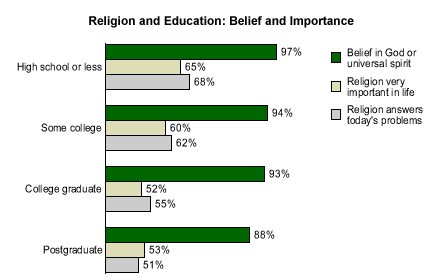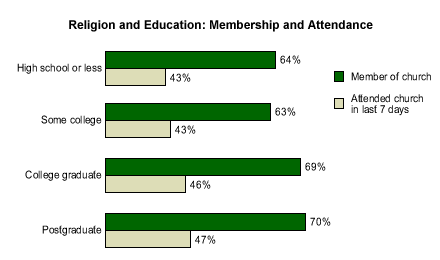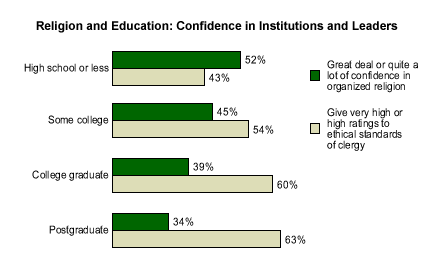Conventional wisdom has it that there is an inverse relationship between individuals' education and religiosity levels -- that is, the higher a person's level of education, the less likely he or she is to be religious. That may be accurate with regard to some aspects of religion, but recent Gallup research suggests that in others it is not necessarily the case.
According to Gallup's 2002 Index of Leading Religious Indicators*, 88% of those with postgraduate degrees believe in God or a universal spirit, compared to 97% of those with a high school education or less. More dramatically, postgraduate degree holders are less likely than those with a high school education or less to believe that religion can answer today's problems, by a margin of 51% to 68%. And those with a high school education or less are more likely than their postgraduate counterparts to say that religion is "important" or "very important" in their lives (65% to 53%). All this would seem to confirm that highly educated individuals put less emphasis on the role of religion than less educated individuals do.

But these data don't tell the whole story. Results from other survey questions indicate that more highly educated people are at least as likely to go to church. Seventy percent of postgraduate degree holders say they are members of a congregation, compared to 64% of those with a high school education or less. And the percentage of postgraduates (47%) and those with a high school education or less (43%) were essentially the same.

The data also reveal a fascinating -- and important -- difference between those with a high level of education and those with minimal education. The former group is less likely to trust organized religion but more likely to trust clergy members, while the latter is more likely to trust organized religion and less likely to trust the clergy. Only 34% of postgraduate degree holders say they have "a great deal" or "quite a lot" of confidence in organized religion, while 52% of those with a high school education or less say so. In addition, 63% of the postgraduate group give "high" or "very high" marks to the ethical standards of clergy, while only 43% of those with a high school education or less do so. Earlier Gallup data show that this pattern of results also existed prior to the Catholic priest sex abuse scandals that affected Americans' ratings of clergy members and organized religion.

Bottom Line
To some degree, those with a lower level of education are more likely to "talk the talk" when it comes to religion -- that is, they're more likely to say they believe in God, place religion prominently in their lives, and recognize religion's importance in the world. But those with a higher level of education are as likely as those with less education to "walk the walk" -- by belonging to a congregation and attending services regularly. These results may point to a failure on the part of organized religion to attract and connect with those with a lower education level, perhaps reflecting the trend in the last century toward more highly educated clergy.
However, even though they do not belong in as great a number or attend as frequently as their more highly educated counterparts, those on the lower end of the educational scale have much more faith in religious institutions, perhaps reflecting a broader tendency to rely on institutions in other areas of their lives -- unions, HMOs, government agencies, etc. Those in this group have far less faith in the individuals at the head of their religious institutions -- the clergy -- than in the institutions themselves.
*The 2002 Index was compiled from surveys of national adults, aged 18 and older, conducted throughout 2002.